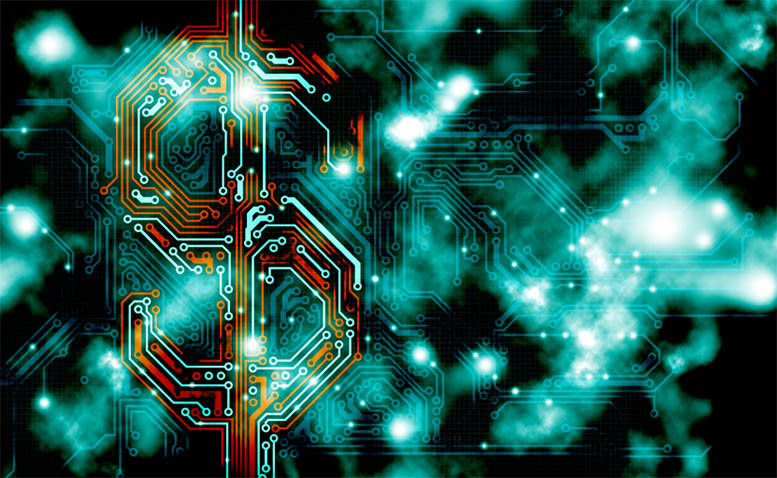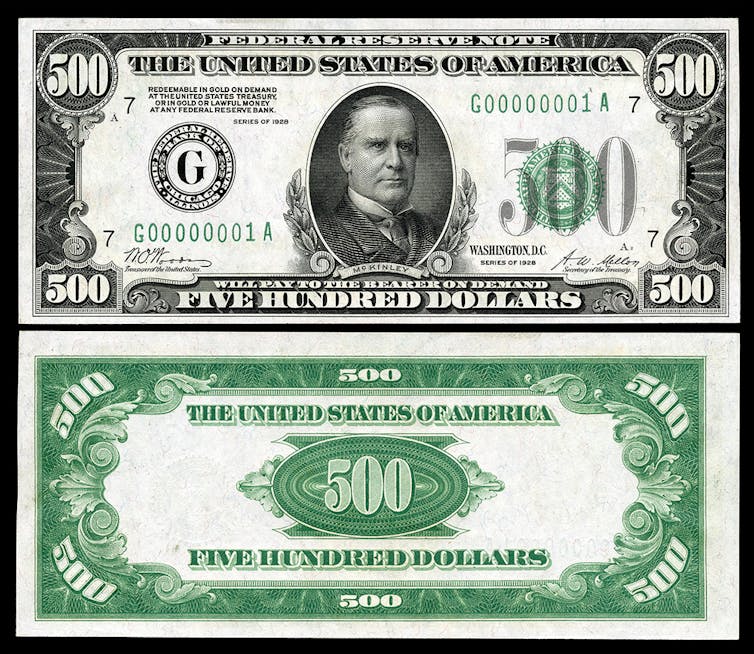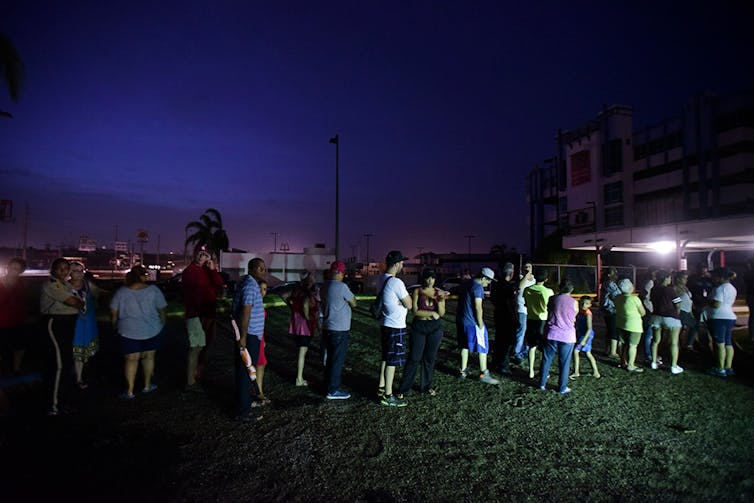 By Jay L. Zagorsky, The Ohio State University
By Jay L. Zagorsky, The Ohio State University
A world without cash seems wonderful at first glance since it is convenient and fast. You don’t need to withdraw dollars or euros ahead of time. You don’t have to worry about money being lost or stolen. Paying for things with your phone is a breeze.
Many countries around the world are steadily shifting away from cash. Canada, the United Kingdom and Sweden have already largely embraced a cashless society. The U.S. is also steadily making the move, with people holding smaller amounts of cash.
However, the recent string of natural disasters and security breaches at major financial entities exposes a huge flaw in this trend: When the power goes out, telephone lines shut down or account information is stolen, it is impossible to use ATMs, credit or debit cards or mobile payments – no matter how rich you are.
In other words, giving up cash increases the chance of the kind of economic catastrophe that results when people can no longer easily trade for the goods they need and want. The solution to this national security issue is simple: bring back the currently maligned large denomination bills like the $500, which was discontinued in 1969.

President William McKinley was the last face to adorn the $500 note before it was discontinued in 1969. National Numismatic Collection, National Museum of American History
Countries going cashless
Recently, some prominent economists have suggested countries should move to a cashless society, with actions like eliminating the $100 bill.
Kenneth Rogoff, a Harvard professor who was also chief economist of the International Monetary Fund, wrote in the Wall Street Journal that going cashless reduces crime by ensuring tax cheats, drug lords, gangs and terrorists cannot easily fund their activities.
If only small bills are allowed, then people making illegal payments need briefcases stacked with huge numbers of small denomination bills like $5 and $10s. This is much more difficult than discreetly using a small envelope filled with a few very high value notes.
Some countries have eliminated high value notes to reduce corruption. India in 2016 eliminated the 500-rupee (about $7.69) and 1,000-rupee notes for this reason before bringing in new denominations.
Larry Summers, an economist who was also president of Harvard and a Treasury secretary, also argued for eliminating both the $100 bill and €500 note (about $592) from circulation. A few months after his recommendation, the European Central Bank decided to stop issuing the large bills by the end of 2018 in an attempt to reduce corruption and terrorism. The Wall Street Journal reports, however, that there is no move yet to kill off Ben Franklin and his $100 note.
Risks of a cashless society
While eliminating high value notes does make illegal transactions harder, it also introduces new risks. A cashless society that solely uses credit cards, debit cards and electronic transfers is dependent on a complex network to replace physical money. This network requires three things to work all the time.
First, there always has to be electricity to power the computers and network storage. Second, communication between all parts of the network needs to be available. Finally, the network has to be secure, so only authorized money transactions occur.
All three of these fundamental requirements for a cashless society have broken down recently in dramatic fashion.
Hurricanes Irma and Maria devastated Puerto Rico in September. Many weeks later, less than 20 percent of the electricity has been restored, and no one really knows when the rest of the island will regain power. Because the electricity has been cut off to almost all cities and towns, the entire island has reverted to an economy based on cash, which is in very short supply. Credit and debit cards can’t be used because there is no way to process transactions and no power to run credit card terminals and readers.
Wildfires are currently ravaging Northern California. One of the problems caused by the fires is that the flames have destroyed numerous cell towers. When the phone network goes down, it is impossible both to reach loved ones and for credit and debit card readers to connect to the network. Without a connection, those without cash can’t buy fuel to flee, pay hotels for temporary shelter or purchase food.
 The devastation in Puerto Rico wrought by recent hurricanes shows what can happen when a society is too reliant on electronic money and cash is in short supply. AP Photo/Carlos Giusti
The devastation in Puerto Rico wrought by recent hurricanes shows what can happen when a society is too reliant on electronic money and cash is in short supply. AP Photo/Carlos Giusti
Finally, we’ve recently learned how unsecure the network that processes transactions and protects our financial data has become. As most people do not possess piles of coins or bills anymore, our money consists of entries in bank and brokerage databases. If those entries change or disappear, people’s wealth vanishes, too.
The Pentagon is trying to ensure that cyberattacks cannot disrupt the financial system. Nevertheless, the capabilities of rogue actors, like North Korea, are increasing. It has even been implicated in stealing millions from a Taiwanese bank.
The recent breach of Equifax’s database and hacks at numerous other financial institutions show security is a major problem.
These events show just how precarious the three pillars of a cashless society are and how quickly they can falter. When this network breaks down, people who do not have cash are forced to barter. Bartering is devastating for an economy, in part because it needs a “double coincidence of wants.”
A double coincidence means your desire to trade something has to happen or coincide at the exact same moment someone else wants what you are offering – and has something you want as well. Moreover, few people in a modern economy own many goods or can provide services that are useful for bartering. When a natural disaster or war strikes, no one wants to barter for collections of antique dolls, baseball cards or china.
 A woman trades fish for ginger near Gauhati, India. AP Photo/Anupam Nath
A woman trades fish for ginger near Gauhati, India. AP Photo/Anupam Nath
A solution
When it works, a cashless society is wonderful. I enjoy not having to carry or worry about cash when I travel. The networks, when they work, are amazing. I have checked my bank balance on the edge of a desert in Botswana using an ATM and paid my taxes from a cell phone in Tokyo.
However, a cashless society means a country’s economy is vulnerable to anything that causes a long-term disruption in power, communications or security. And those threats are rising. The number of natural disasters striking the U.S. is increasing, and wars are no longer being fought using just conventional weapons. Today the computers that control a country are playing a much bigger role.
 Shifting to a cashless economy makes a country more vulnerable to both disasters and wars. National defense is not only about boots, guns and bullets. It is about keeping the economy running at all times. Cash can ensure the economy won’t collapse in an emergency, since people with cash are still able to buy and sell.
Shifting to a cashless economy makes a country more vulnerable to both disasters and wars. National defense is not only about boots, guns and bullets. It is about keeping the economy running at all times. Cash can ensure the economy won’t collapse in an emergency, since people with cash are still able to buy and sell.
The solution is simple. Governments need to bring back higher value notes like $500 bills. There clearly are negatives to bringing back large bills, which make it easier for crime and corruption to flourish. I believe, however, that the positives outweigh the negatives, particularly the usefulness of cash during disasters.
![]() Whether governments bring back larger bills or not, store some cash at home in case of emergency. When disaster is about to strike and it is time to flee, having cash in your wallet or purse can make the difference. Cash gives you purchasing power when everything else fails.
Whether governments bring back larger bills or not, store some cash at home in case of emergency. When disaster is about to strike and it is time to flee, having cash in your wallet or purse can make the difference. Cash gives you purchasing power when everything else fails.
Jay L. Zagorsky, Economist and Research Scientist, The Ohio State University
This article was originally published on The Conversation. Read the original article.

just thought i should mention tally sticks….becuase
A cashless society makes us totally vulnerable to the whims of the banks. You have no choice but to store all of your excess wealth with them. You can be impoverished in seconds with little if any recourse. Even if that doesn’t happen they can bleed you with fees. For example, Bank of America tried to charge its customers $5 every time they direct deposited their paycheck with them. In a cashless society you are totally at the mercy of the banks.
A cashless society means expunging your right to own currency and give it all to the banks who are such paragons of virtue!
The main medium of exchange of criminals is electronic. I’ll just comment on one of the criminal sectors but rest assured there are other sectors.
What’s the extent of banking fraud? The world’s BIGGEST CRIMINALS, on record, are the bankers who are fined BILLIONS every year for rorting the system, illegally controlling credit (such as Libor) and all manner of electronic crime that hardly gets discovered or reported.
For example, from Reuters: “Four major banks pleaded guilty on 20th May 2015 to trying to manipulate foreign exchange rates and, with 2 others, were fined nearly $6 billion in another settlement in a global probe into the $5 trillion-a-day market.” (Incidentally no-one went to prison.)
And if we consider just the ‘little criminal’ for the moment, I have a friend who has had no less than 3 credit cards illegally charged to the tune of over $10,000 in the last 9 months alone. Two of these cards were with C…….. The hassle of cancelling them and getting new ones when he had done nothing wrong was a nightmare. Seems digital information entrusted to banks is actually much less secure than cash. My friends and I have not been mugged at all. Ever!
Maybe North Korea, which already successfully produces quality $100 bills, might assign its engravers the task of reproducing the higher value notes, from $500 up to $100,000 !
Time for the faces of Woodrow Wilson and salmon P. Chase to again circulate on our currency! lol
Woodrow Wilson is the president who gave power to the central bankers to do all this damage. He should be anathematised.
I meant that it was Wilson who is on the $100,000 note!
I guess you haven’t seen too many $100,000. bills lately! lol
Those were only (or primarily) used for bank-to-bank money transfers.
It is much easier to launder digital money, no heavy lifting.
the banksters demonise cybercurrencies, so that the rebel in us will take a more serious look at the system.
our children and grandchildren, who probably won’t ever even deal with paper money, will live with the constant fear of “will i still be able to access my money or pay my bills?” it will be easier for the “authorities” – banks, banksters or government – to limit your access to your own account
at the present moment they still can’t do it arbitrarily, they need a warrant, or to have you convicted of crimes (even if they have to falsely accuse you or question your sanity) when it’s all cyber, nobody else would even be aware that your account has been frozen, defrauded or emptied (by criminals or the real criminals – government)
right now, all of your heirs know that you have at least one bank account, which leaves a paper trail. a cyber or digital account could probably disappear quicker than this comment of mine took to type out
every change has some potential problems and potential advantages. For years after the US went to currency after the civil war after the Sough had begun printing currency which had no real value, and even banks in the N could print their own currency, we had trouble compaing the actual underlying value of one ot another, so when the S lost the Civil war its currency really did become worthless so those who had taken it on good will got stung and even the currency printed by different banks in the same cities or states had different real values, the US, to protect its citizens had to print a uniform currency, with the value being in gold, which had a value that was strictly regulated, with the currency redeamable in gold, but this created a problem of its own because gold could still be mined and and hoarded so it would not circulate, and finally the fixed value of gold wore out, so the US went to the less rare metal, silver standard where the release of quantities would not have such a great impact on the economy of the nation. Then, in the 1970’s came the Hunt Bros who tried to corner the market on Silver using their inherited fortune from their very conservative H.L. Hunt, who had a primary canned food business, but acquired his great weath in the Oil Market, so for a few years we still had the HLH brand of canned goods on grocery store shelves, and the Hunt Bros went from these to going into the Sugar Business with Great Western Sugar company with refnieries all along the Eastern Side of Colorado, with the advantage of having their product protected by very high terriffs from foreign competition. Not being busincess men in their own right, they overproduced refined sugar, and since the market had been divided with allocations to each of the domestic sugar companis, they got stuck with too much inventory relaltive to their fair share of the market. This explains why the large storage silos for the refined sugar remain along side of the closed sugar factories, so on a state by state basis they still had to pay property taxes on their infrastrure without getting the profits to cover that by sales of their product, so in this area the Hunt Bros went broke while depending on the money for sales to do the cornering of the silver market. By buying up silver they created their own market which, just because of their buying cost them more until finally they had no more money to buy silver, so the price fell to the point where it was much below the price that they paid, so instead of becoming silver controllers, they became poor and are probably living in double wides somewhere.
Also before 1969 the US also had some very high face value currency, that was actually just intended to make inter-bank transfers, and there was actually a million dollars in currency on display in front of one of the Vegas casinos, which attracted gamblers. The reason why the $500 bill went out of circulation was because of the drug trade, so the holders of these notes were given a certain amount of time to redeem or deposit them before they would become worthless as instruments of trade, and to avoid being discovered, the bid drug dealers just burned them so that they could continue in business, and along with his little hysteria, there came a limit of $10,000 in currency that any person could own, with money over that amomout being legally definded as products of illegal transactions subject to confiscation. This created the problem of local confiscation, so if an idividual was stopped for a broken tall light in a passenger vehicle, it was possible for local authorities to detain and search the vehicle and its passengers, and if they were found to be carrying to much cash (based on local definition) they could seize it and then make the people with the cash show that they had come by it legally. For example, I bought a big, but used large motor home in 2000 and since I had gone credit card free some years before, I just went to my bank and withdrew a large amount of cash and put it in a safe that was built in to my motor home. I could feel relatively safe in doing this because motor homes are leagally the same as other homes with the fact that they are self propelled making them different from such things as a pick up with a campler, so the warrant requirement is much higher, and before starting our trip made sure that there was a branch of my bank so that, if necessary, we could resupply.
One of the problems with our government keep up with the new realiaty of state leagalized pot, whether medical or recreational, is still illegal on the Federal level, is that the owners or operators of the legal dispensaries cannot deposit their cash, or take credit cards as bank transactions, so they must personally or collectively hold their cash themselves or as common depositories – the old banks that already have walk in safes are very popular. One of the houses and busineses that was consumed by the fire in CA was that the owner not only had his money burned, but also his state legal grow operation.
The the number of bit coins being highly controlled, they are bound to increase in value, with the problem that there are no values below that of the basic coin, which may or may not be accepted by anyone or any business. So if you have bit coin that has the current value of $100 and you need just a loaf of bread and bottle of milk, you might be able to find a store that will take it but not at its current value – the same with any precious metal. If you have a Kugerand can you actually spend it directly and get the full value of gold at the time. We are still working out the kinks in our montary system, but in that just in case event, I always carry a few of the now fairly rare outside of the banking system – checks, which are taken at the merchant’s risk, but can be made out for the exact amount. If our banking system actually goes down, our pay checks or benefit checks will not be deposited by EFT, and so there will be no money in our accounts to buy anything except on the good faith of the place that accepts that the money is not there yet and gives you the benefit of the doubt. There are and always will be some chances or risks.
By the way, the main international export of North Korea is our $100 bill, which they launder and use the proceeds to make transactions in a real currency. A few years ago when the designs were changing rapidly, the reason was to try to defeat the NK printers, but we finally gave up because a couple of days after we had changed design, the NKs were printing their copies of the new ones. Our embargo on NK is not going to succeed.
An interesting thing just happened. The Fed just sent plane loads of cash to Puerto Rico .
Of course they will probably want it all back sooner or later.
Just goes to show how the idea of electronic-only money will work in a crisis.
I would not print – Federal Reserves Notes…instead print Silver certificates. Of course you might be risking being assassinated, just ask JFK.
Cashless society and disarming all countries are the two things that the NWO need in order to complete their goals of a one world government. They can’t do it without these two things.
Which is why the push for heavy handed gun laws and eliminating paper currencies. Things are going to get real interesting in the coming years.
How is the U.S. government going to compensate terrorists without cash?